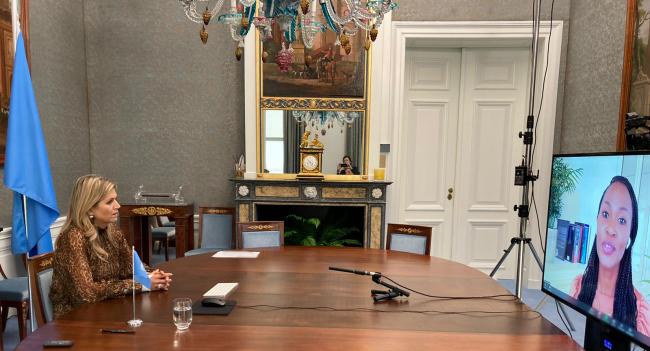
UNSGSA Queen Máxima provides virtual opening remarks for the UNGA G7 Partnership High-Level Event Digital Financial Inclusion for Women in Africa: A Path to Recovery, Resilience, and Innovation, on 28 September 2021.
(Note to media: Check quotes against delivery).
---
Ladies and Gentlemen: it is an honor to be here. I would like to recognize African policymakers listening today, as well as the leadership of Minister Le Maire and Ms. Melinda French Gates. Thank you also to Ms. Djibo and Ms. Kibombo for sharing their perspectives.
It is a challenging moment for the world. Job and incomes continue to be lost due to the pandemic. Governments, many of which have expended unprecedented fiscal resources, are grappling with uneven results from recovery efforts. Although per-capita income in 90% of advanced economies is expected to bounce back to pre-pandemic levels next year, only one-third of low-and-middle income countries are expected to do the same.
These inequalities underscore the importance of supporting an inclusive economic recovery. This is particularly relevant in Africa, where 63% of women live and work outside the formal financial system. And where small businesses, which were among groups disproportionately affected by the pandemic, account for the overwhelming majority of employment.
What does an “inclusive recovery” mean for Africa? It means understanding women’s specific experiences in the face of COVID-19 and placing them at the center of efforts to boost resilience.
Why? Because women have been hardest hit by the pandemic. They have exited the labor force in far greater numbers than men. They are often primary caregivers at home. They rely more on informal work and subsistence farming, meaning increased exposure to production- and climate-related shocks. And they also confront complex social norms.
Today, I offer three reflections on what we have learned the past year about the role of digital financial services to support an inclusive recovery for women across Africa.
First, investing in digital public goods that support financial inclusion for women is no longer a luxury — it is a necessity. These goods, as many of you know, include digital IDs and connectivity. They also include regulation supporting digital payments, well-functioning and interoperable payment systems, and rules protecting consumers and managing data. It is important that these investments are made with the specific needs of women in mind from the start. For example, developing payment services that work with a variety of mobile phones is important given the gender gap in smartphone ownership.
Countries across Africa — including Togo, Namibia, Burkina Faso and Benin, to name a few — have accelerated these investments and delivered quick economic relief to citizens via digital payments. Some aptly prioritized women. In doing so, these programs provide underserved groups an on-ramp to financial inclusion. And they create opportunities to access and use other products, including savings and insurance. These investments should be applauded.
So now is the time to help bring forward countries that still lag behind. We have the technical solutions. Governments can step up commitments to accelerate these investments for the benefit of women and of economic recovery.
Second, we must invest in digital solutions that support resilience and livelihoods of African women. In practice this means:
- Looking beyond access to basic accounts, and towards savings and insurance products — let’s ensure people have the proper tools to build long-term buffers.
- Using technology and innovation to better meet the financial needs of women.
- For example, in Tanzania, women with access to solar lamps through pay-as-you-go financing reported being more likely to work outside the home.
- Tasks that previously needed daylight could now be completed at night, leaving more time for productive labor activities during the day.
- Women also reported more flexibility to manage childcare and household chores.
- Yet, while today’s global PayGo market reaches 100 million people, only 25% of customers are women. More tailored solutions are clearly needed.
- Promoting resilience and livelihoods also means supporting the recovery of women-led businesses from COVID-19 through targeted credit lines and well-designed business training programs.
- And encouraging microfinance institutions and cooperatives – which remain a key provider of financial services to women in Africa – to digitize in order to offer services more efficiently.
Third, we can acknowledge that digital technology is not in itself a panacea. Women need the appropriate skills and opportunities to use it meaningfully. Bolstering digital and financial capability will help ensure digital technology does not create further divides between men and women. Closely related, we can also double down on efforts to protect users from fraud, ensure data protection, and address algorithm biases in digital platforms.
Looking ahead, we have an historic opportunity to recover from COVID-19 in an inclusive manner. One that gives African women and girls the financial tools they need to live more productive and safer lives. To do this we will need to:
- Accelerate foundational reforms that support digital financial inclusion for women.
- And invest in interventions that foster long-term resilience, financial health, and improved development outcomes.
The G7 Partnership offers an excellent platform to accomplish this. I encourage pillar partners to intensify work and coordination amongst themselves. It is also important to build out a comprehensive results framework to ensure accountability under the partnership.
I also would like to recognize local leaders active across Africa committed to supporting women’s digital financial inclusion. The G7 Partnership pillars stand ready to support and provide the technical tools to make meaningful change on the ground.
Thank you.